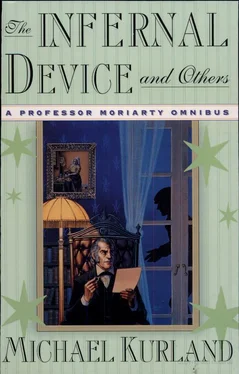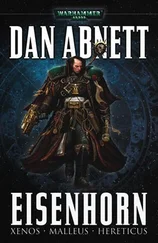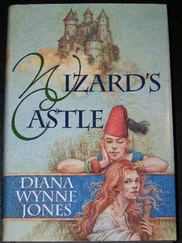"Fairly well," Quimby said. "As well as one can get to know somebody in a short time. We are all in the same boat, so to speak, and it gave us a strong community of interest. We were possessed of a great desire to discover who committed the murders, and how they were accomplished, even before we discovered that we ourselves might be blamed for them."
"Did you come to any conclusions?" Barnett asked.
"No, sir, unfortunately not. Of course, it is not a field that we are particularly competent in. That is why I was so pleased to discover that Mr. Holmes is taking an interest in the problem. He is highly thought of."
"In your own mind there is no chance that either of your friends might actually have had a hand in the, ah, crimes?"
"No chance, sir. Neither of them had a motive. On the contrary, they both lost good positions upon the deaths of their employers."
"Scotland Yard contends that they were paid off by some third person to either commit the deeds themselves or allow someone else access to the bedrooms."
"I cannot believe that, Mr. Barnett. Neither of them is the sort of man who would murder his employer. Also, neither of them was in a position where a desire for immediate financial gain would outweigh the need for security of employment."
"I understood that Margery was an inveterate racecourse-goer."
"Yes, sir. He has what I believe is called a 'system,' sir. Has put away quite a little nest egg with it."
"You mean he wins?"
"Not invariably, but certainly more than he loses."
"And what about Lizzard? Word is that he has a lady friend in Wembley."
"Mr. Lizzard is seeing a lady who lives in Wembley, sir. That's true enough."
"Was his butler's salary sufficient for his, ah, needs in this regard?"
Quimby pondered this for a moment. "Actually, sir," he said, "the size of Mr. Lizzard's salary is not relevant in this case, the lady in question being the sole owner and proprietress of a public house. She has asked Mr. Lizzard to come into the business as her partner, feeling, as she says, that the presence of a man about the establishment is desirable."
"It sounds like a subtle proposal of marriage," Barnett commented.
"I have no doubt that matrimony is in the lady's mind," Quimby said, "but the offer is a straightforward business offer. I would assume that she's waiting for Mr. Lizzard to do the proposing."
"An enviable position for the gentleman to be in," Barnett said, "if he is fond of the lady. And it would certainly seem from that as though Lizzard was not in any desperate need of funds."
"I would say that was so," Quimby said.
"Thank you for your assistance in this," Barnett said. "Is there anything else that has come to your attention during these past weeks that I have neglected to ask about that you think might have any bearing, however slight, on the question of the murders of your employers?"
"Well, sir," Quimby said, "as I declared before, the field of criminal investigation is out of my provenance; I really can't say what would be of interest to the trained investigator." He paused. "There is one thing, however, which I find interesting."
"And that is?"
"Well, sir, it's possibly only indirectly related to the murders themselves, but it is curious just the same. There has been another gentleman here asking questions. And despite the lack of publicity given to the subject, he seemed to know the details of the killing of my master, Lord John Darby."
"That is curious," Barnett agreed.
"Not only that, sir, but there's something even more curious about it."
"Yes?" Barnett urged.
"Well, sir, he called himself Mr. Plantagenet, but he was the spitting image of Lord John. Could have been his brother."
TWELVE — INTERLUDE: NOT TO BE
The fever called "Living" Is conquered at last.
— Edgar Allan Poe
The night had been long and physically exhausting; but his sport was the game of life, the game of truth, the devil's game, the only game worth the playing. And this night the game had been piquant and especially fine. Desmond Chauvelin had been loath to leave the squalid building wherein lay concealed his very private club.
Two girls this time, the older a hardened street-wise moll, course and foul-mouthed. But the younger — no more than sixteen, slender, with pale, unblemished skin and a fair, frightened face. A delicate flower to find among the street weeds with whom they usually practiced their arts. Where did the Master Incarnate find such a girl? Better, he realized, not to wonder. And, in truth, Chauvelin was really not interested in the girl's antecedents. It was her slender, unmarked body, her youth, her innocence, and her capacity for terror that he found so supernaturally exciting. There is a special quality in tortured innocence — a pain-heightened wide-eyed terror: fear mingled with disbelief, and the constant hope of surcease — that is highly valued by the connoisseur.
The rose-trimmed ebony brougham coursed through the deserted streets of the West End of London, its steel-shod wheels pounding an allegro along the pavement. Chauvelin stretched his plump body across the wide cushioned seat and idly watched the gaslights pass in orderly procession outside the coach window, which was rolled up against the predawn chill. For all that life was tedious and dull, he mused, there were brief moments that blazed out with a hellish fire.
He sometimes thought that at a certain point in the intricate, prolonged ceremonies of this game of games, the slaves became truly aware. He could see it in their eyes: he could watch the comprehension grow with the careful repetition of pain, the measured torment, until it surpassed the fear, and transcended the weak flesh. So it had been with this girl; knowledge had grown under the screams. The knowledge that was greater than wisdom: that all was hopeless and that there was no escape; that life had no more meaning than death, and that pain — physical pain — endless pain — sensual overwhelming pain — was the closest one could come to reality. They all said they were grateful, of course; he made them say it. It was one of the rules. Humble appreciation for the pain that gave them meaning and assured them that they were still alive.
The brougham turned off Old London Road onto Bentham Way, and the coachman slowed up as they approached the gate to Infant Court, the small, private circle on which fronted three residences: that of a duke, another of an exiled queen, and his own.
Chauvelin was roused sufficiently from his reverie by the brougham's slowing and stopping before the gate to watch as two guards — in the comic-opera uniforms of the deposed queen's household troops — opened the gate and waved the coach through. He chuckled as they closed the gate behind him. Guarded like royalty, he was. Buttoning his waistcoat and the top button of his jacket, he allowed the coachman to swing down and open the brougham's door for him and then stepped gingerly out and waddled across to his own front door. The coachman, wise in the ways of his master, clambered back up to the driver's seat and swung the brougham away without pausing for further instructions. Chauvelin expected his servants to behave like automata, without prompting, without recognition, without gratitude. When he stretched his hand out for his evening snifter of brandy, it had best be there. How it arrived there was not his concern.
The butler was neither required nor expected to man the front door after midnight; Chauvelin trusted no man's discretion save his own. He let himself in with his own two keys, lit a taper with a wooden safety match, and thumped his way up the broad staircase to his bedroom.
His bedroom was a rectangular room, much longer than it was wide. The ancestral four-post canopied bed crouched at the far end, away from the windows. Across from the door were three matched chiffoniers and a specially built triple-size wardrobe closet. Desmond Chauvelin did not believe in being far from his extensive collection of costumes and accouterments. Whatever one does, one must be correctly garbed for the occasion; and one might be called upon to do the strangest things on the shortest notice.
Читать дальше












